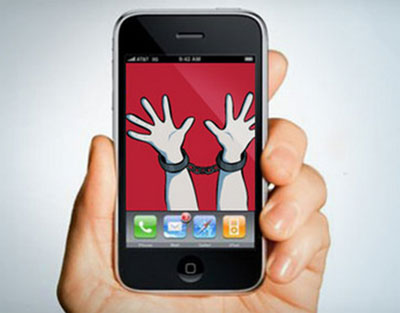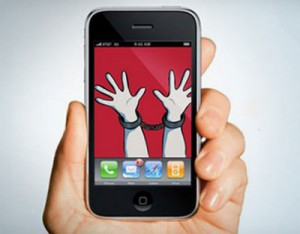
The “Right to Record” becomes “The Right to Remain Silent”
November 10, 2011Student Blogs Article In the spirit of Halloween, I’d like to tell you a scary story. Imagine you’re walking down the street when you see a police officer having a hard time while confronting a disrespectful teenager. Suddenly, the officer throws the teenager to the ground, kicks him to make sure he stays down, and starts vigorously roughing him up as she handcuffs him. Shocked by the sudden violence, you grab your cell phone to record the incident. Perhaps you intend to file a complaint against the officer; perhaps you want to help the teenager if he decides to sue; perhaps you’re just interested. The officer notices you recording the incident, and walks over to you. She asks, gruffly, if your phone is recording audio, as well as video, and you answer “yes” without really thinking. The next thing you know, your phone has been confiscated and you find yourself cuffed and under arrest, being hauled off to jail along with the teenager.
In the spirit of Halloween, I’d like to tell you a scary story. Imagine you’re walking down the street when you see a police officer having a hard time while confronting a disrespectful teenager. Suddenly, the officer throws the teenager to the ground, kicks him to make sure he stays down, and starts vigorously roughing him up as she handcuffs him. Shocked by the sudden violence, you grab your cell phone to record the incident. Perhaps you intend to file a complaint against the officer; perhaps you want to help the teenager if he decides to sue; perhaps you’re just interested. The officer notices you recording the incident, and walks over to you. She asks, gruffly, if your phone is recording audio, as well as video, and you answer “yes” without really thinking. The next thing you know, your phone has been confiscated and you find yourself cuffed and under arrest, being hauled off to jail along with the teenager.
Unlike danger in many scary stories, this danger is real, and in a few states (including Illinois) your arrest would be perfectly legal. Broadly-written wiretapping laws, enacted to protect peoples’ privacy, have been twisted and used in a draconian manner by police and prosecutors to silence private citizens who record police officers, in public places, while the officers are performing their official duties. Wiretapping statutes, written forty, thirty, or even just ten years agoin no way contemplated a world in which an overwhelming majority of Americans carry video and audio recording devices at all times. An interesting article in the magazine The News Media &The Law discusses the prevalence of cameras and camera phones and their impact on clashes between police officers and those who film them.
Use of wiretapping laws, by police officers and prosecutors, to arrest and prosecute otherwise innocent people filming the police in public is unacceptable, in my view. The idea that a citizen can be arrested and charged with a felony for documenting the activities of public officers performing their duties, where the citizen is not interfering with those duties is both legally untenable and makes for disastrous public policy. Legally, there is a strong argument that a right to record the police is protected by the First Amendment. In a very recent case (August 2011), Glik v Cunniffee, 655 F.3d 78 (1st Cir 2011), arising out of a situation similar to the “scary story” described above, the First Circuit Federal Court of Appeals agreed, stating that “the First Amendment protects the filming of government officials in public spaces”. This unfortunately contrasts with a case decided in January of 2011, ACLU v Alvarez (available on Lexis at 2011 U.S. Dist. LEXIS 2088, no public cite available) from the Federal District Court in the Northern District of Pennsylvania. The court in Alvarez held that protecting the recording of police officers would be “an unprecedented expansion of the First Amendment.”
Are there other bases on which to defend a “right to record public officials”? Does it matter if the recording stays private or is made public? Next month, I will return with a post devoted to the reasons why sound public policy demands that the courts protect this “right to record,” and discuss the possible consequences if courts uphold the alternative.
You may also like
3 comments
- April 2024
- March 2024
- February 2024
- November 2023
- October 2023
- April 2023
- March 2023
- February 2023
- January 2023
- December 2022
- November 2022
- October 2022
- May 2022
- April 2022
- March 2022
- February 2022
- January 2022
- December 2021
- November 2021
- October 2021
- May 2021
- April 2021
- March 2021
- February 2021
- January 2021
- November 2020
- October 2020
- September 2020
- August 2020
- July 2020
- June 2020
- May 2020
- April 2020
- March 2020
- February 2020
- January 2020
- November 2019
- October 2019
- September 2019
- April 2019
- February 2019
- December 2018
- November 2018
- October 2018
- September 2018
- March 2018
- February 2018
- January 2018
- December 2017
- November 2017
- October 2017
- September 2017
- May 2017
- April 2017
- March 2017
- February 2017
- December 2016
- November 2016
- October 2016
- April 2016
- March 2016
- February 2016
- January 2016
- December 2015
- November 2015
- October 2015
- June 2015
- May 2015
- April 2015
- March 2015
- February 2015
- January 2015
- December 2014
- November 2014
- October 2014
- August 2014
- March 2014
- February 2014
- January 2014
- December 2013
- November 2013
- October 2013
- September 2013
- May 2013
- April 2013
- March 2013
- February 2013
- January 2013
- December 2012
- November 2012
- October 2012
- September 2012
- June 2012
- April 2012
- March 2012
- February 2012
- January 2012
- December 2011
- November 2011
- October 2011
- September 2011
- August 2011
- April 2011
- March 2011
- November 2010
- October 2010
- September 2010

I’m fairly certain there are other instances that favor the outcome of Glik v Cunniffee, 655 F.3d 78 (1st Cir 2011) particularly if one examines legislation affecting mass media. I know there has been some discussion as to whether recording audio should be allowed; however, if you’re on public property not purposefully trying to invade one’s privacy then it truly shouldn’t be a problem. Police should be held to the same standards of privacy as everyone else:
“If you don’t want others to see you do something in public, then don’t do it.”
Should a police officer *really* have an expectation of privacy on a side walk? No, particularly if he’s being inappropriately rough toward a citizen. At that point he’s committing a crime and needs to be held accountable. How are citizens supposed to protect themselves and/or others if the police are able to silence those who may damage their reputation? We fought a Revolutionary War to retain our freedom of speech and guarantee certain human rights to everyone, and no one should be subjected to police brutality. If the police are able to confiscate the evidence and be cleared of any wrong doings, then it’s time for a change in legislation.
One of the most effective ways to keep public officials clean is to expose them to scrutiny. The idea that police officers somehow need — or even deserve — privacy while conducting their affairs is absolutely ridiculous.
Looking forward to your next post!